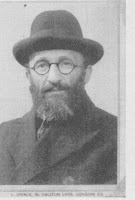It didn’t happen overnight. It was a gradual change. The essencials that made up who I was seemed to slip away.
An ambush, probably. A covert operation, if you will. I couldn’t really say when it first happened. I do know that at somepoint I did or said something and realized that “this isn’t me.”
On of the biggest weapons of the Yetzer Hora is to make us forget who we are. It could, in fact, be the biggest Yetzer Hora out there. This mode of attack is based on making us forget or become desensitized to the fact that each of us are a child of the King of Kings. This happens when we become to comfortable with ourselves, our abilities, and our hopes. It’s an attack that hurts, an attack that confuses us (which is the main goal of the Yetzer Hora) from different angles: our goals, our motivations, our enthusiasm, and our accomplishments.
And to make things worse, when this happens to me and I reflect on it (after the fact) I’m almost impressed with the tactics used by this Yetzer Hora. It’s not that I forget about the King, chas veshalom, because that would be too easy. No, it’s not an attack against Hashem. It’s simply forgetting that I’m the son of the King. It’s the impression that I have no connection or invitation to the Kedusha, the Torah, or the Mitzvos that Hashem created for me. That’s the knock-out punch.




